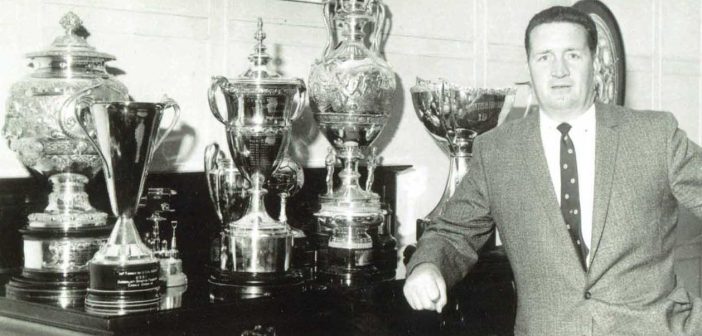JOCK STEIN was born on this date in Burnbank, South Lanarkshire, in 1922 – 101 years ago.
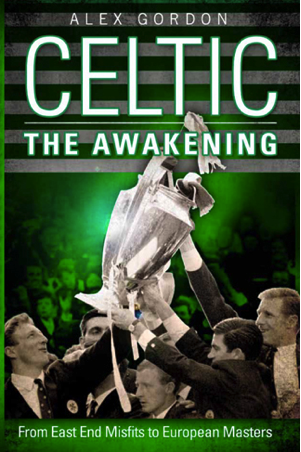
JOCK STEIN’S father was a Rangers supporter who one day hoped his son, adept at centre-half or left-half, would sign for the Ibrox side.
It was his wish Jock should play in the blue-red-and-white of Junior side Blantyre Vics before swapping it for the blue-red-and-white of Rangers. Jock, though, displayed a very independent streak early in life. He was not rebellious and never displayed the slightest bit of curiosity concerning the religious divides of a small mining community in Burnbank.
However, later in life, Jock Stein also never made any attempt to disguise the fact he thoroughly enjoyed beating Rangers.
According to Celtic players, Stein had been somewhat irked by the media coverage carved out for Davie White who had taken over from Scot Symon as Rangers manager in October 1967.
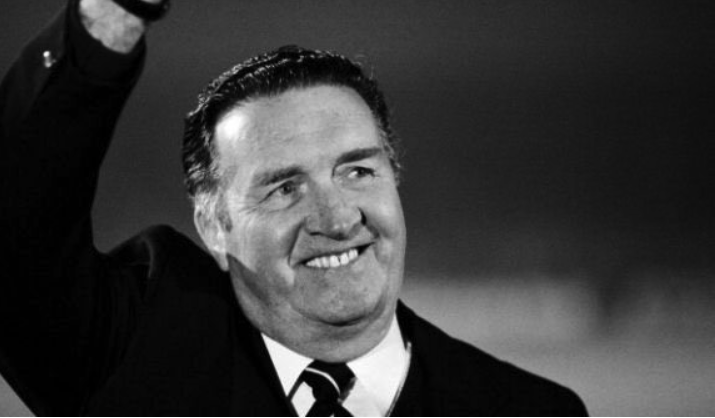
HAPPY DAZE…a beaming Jock Stein celebrates another success.
White, at the age of thirty-four, had won all of his first eight league games, his stock was on the rise, praise was avalanching his way and a new-found status was being carefully cultivated. He was seen as the brash Young Pretender, a tracksuited man of the sixties.
Stein, though, was not about to be overshadowed and was determined to leave White’s so-called new standing in tatters after the Old Firm head-to-head on the second day of the new year in 1968. As ever, he wanted to win this game. More than ever, though, he was eager to triumph while rubbing Rangers’ noses in it.
Now it was showtime. Celtic v. Rangers; Jock Stein v. Davie White. Bertie Auld recalled: “Publicly, Big Jock would inform everyone that a meeting with Rangers was just another game. Privately, the players all knew just how much he enjoyed putting one over our old rivals.
“I would go as far as to say he detested Rangers. I don’t think that is too strong a word. He really disliked them. We all knew his background, we realised where his roots lay, but we also saw him after a win over Rangers. You would have needed plastic surgery to get the smile off his face.
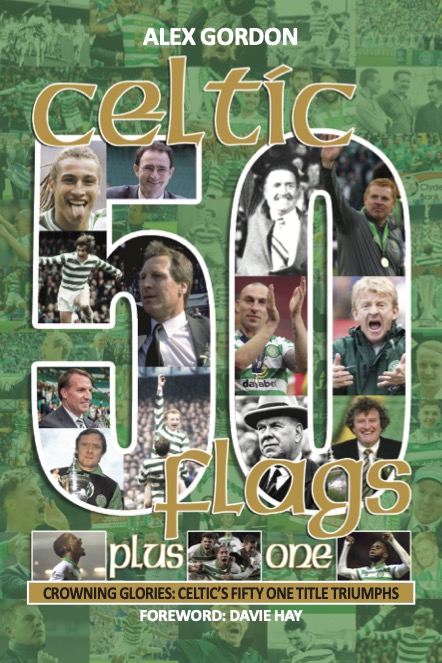
READ ALL ABOUT IT…Alex Gordon’s tribute book to Celtic’s history of title triumphs, covering Jock Stein’s ten championships, including the astonishing nine-in-a-row.
“He rarely, if ever, talked about the sectarian divide. He was a Protestant managing a club with Catholic origins and he had Protestant players such as Ronnie Simpson, Willie Wallace, Tommy Gemmell and myself playing for him. Religion didn’t come into it as far as he and Celtic were concerned. It did across the Clyde, though. For long enough Rangers would not sign a Catholic.”
Auld also recalled Stein preparing for the first of White and added: “I think Jock sensed panic in Rangers’ decision to dismiss Scot Symon after his thirteen-year reign and appoint a much younger man. The press had talked up Davie White as a new breed of manager, one for the future with fresh, wonderful, innovative ideas, all that sort of thing.
“So far, though, as the Rangers manager, he hadn’t come up against Jock Stein or Celtic. As you would expect, Jock would show every respect and every courtesy to a fellow professional sportsman, but, deep down, we all got the message he was eager for Rangers’ new boss to understand what pressure, real pressure, was like.”
With a minute to go, Celtic were leading 2-1 with goals from Bertie Auld and Bobby Murdoch and it looked as though Stein would get his wish of a victory over his young managerial challenger.
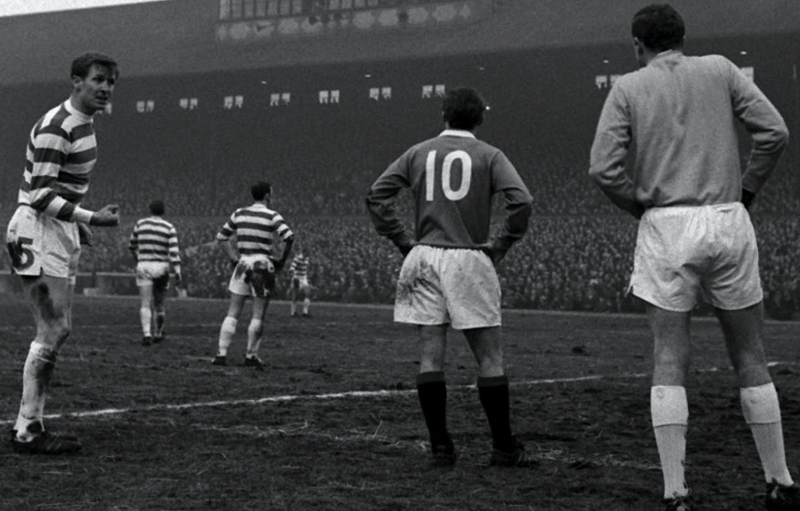
Mr MOTIVATOR…skipper Billy McNeill has a word with keeper John Fallon during the 2-2 draw with Rangers in January 1968.
Kai Johansen broke from his own half down the right. He peered through the deteriorating conditions before trying his luck from long range. He didn’t connect properly and the ball seemed to bounce weakly towards John Fallon. The keeper, who had replaced the injured Ronnie Simpson just before the game, allowed the effort to crawl under his body and barely cross the line.
“‘I must admit it was a howler,” said Fallon. “After the game, Big Jock looked as though he wanted to strangle me.”
After all the meticulous planning by Stein, Rangers and White had got off the hook. Celtic were by far the superior outfit on the day; there could be no argument about that. What was also undeniably true was the fact that the new Ibrox man in charge had left Celtic Park still unbeaten after ten games and with Rangers remaining two points ahead in the race for the championship after overcoming their most difficult obstacle.
As the games and months ticked by, both teams continued to win, neither looked like faltering with the finishing tape in sight. Rangers travelled to Tannadice for a midweek confrontation with Dundee United while Celtic rested. After this game, the clubs would have five matches each to play during the month of April.
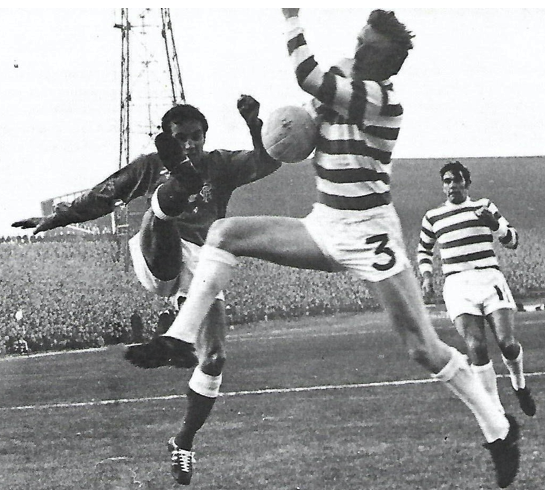
NO HOLDS BARRED…Tommy Gemmell blocks an effort from Rangers’ Willie Henderson as John Hughes looks on.
Remarkably and unexpectedly, Rangers shed a point in a goalless stalemate on Tayside. It was the first time their forwards had fired blanks since the fateful afternoon against Dunfermline in Glasgow at the tail end of October, the result that saw Scot Symon dismissed.
The way the fixture list panned out, Celtic had been left with six away games from their final nine. Rangers, too, would play away from Ibrox in three of their remaining four with the last game against Aberdeen due at Ibrox on 27 April when Celtic had a day off with their scheduled opponents, Dunfermline, playing in the Scottish Cup Final.
It was possible, therefore, for Rangers to go a long way to winning the championship with Celtic idle and powerless to do anything about it. On Wednesday evening 17 April, Celtic played Clyde in the Glasgow Cup Final and thrashed them 8-0 with a hat-trick from Bobby Lennox, two from John Hughes, one from Jimmy Johnstone and two booming drives from Bobby Murdoch and Tommy Gemmell.
However, the events at Hampden were of little consequence with most of the attention a few miles away in Greenock where Morton were taking on Rangers. Amazingly, with twenty minutes remaining, Morton were leading 3-1 with Joe Mason, later to become a coach at Ibrox, terrorising the Rangers rearguard. The Ibrox side retaliated and eventually two goals from John Greig and one from Willie Johnston helped them scramble a 3-3 draw.
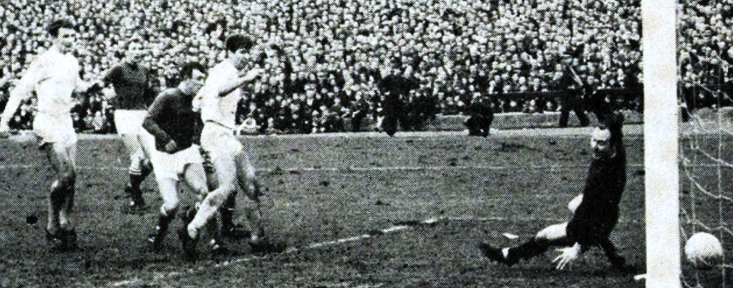
LAST-GASP LENNOX…the Celtic striker stabs the ball wide of Morton keeper Andy Crawford for a pricess winner.
With two games to go, Celtic were now on top of the table, albeit on goal average. Celtic had scored 102 goals and conceded twenty-two as opposed to Rangers’ eighty-nine for and thirty against. Stein’s men had claimed thirteen more and conceded eight fewer. Their goal average was 4.64 compared with Rangers’ 2.97.
Celtic knew they could afford to win their remaining two games by the slenderest of margins and the championship would be theirs for the third successive season. Rangers could win two and match them on points, but only a miracle would pull things around in their favour as far as goal average was concerned.
Celtic fans applauded the Morton players onto the Celtic Park pitch three days after they had done their team a massive favour. No set of visiting players had ever received such a warm and delirious reception. The natives weren’t so friendly, though, with a minute to go. The game was deadlocked 1-1 and it looked very much as though a good turn from old Parkhead favourite Jim Kennedy was about to backfire on the team closest to his heart.

READ ALL ABOUT IT…Alex Gordon’s tribute book charting the rise of Celtic in the sixties.
All was going according to plan when Willie Wallace flicked a close-range effort wide of the exposed Andy Crawford. “Really, that should have settled us,” said the man known as Wispy. “Maybe it came too early, but we didn’t attack consistently as we knew we could. The fans sensed it, too. If it remained like that, we only had to beat Dunfermline in the last game and, irrespective of what Rangers achieved, the title was ours. It was difficult to get that thought out of your head.”
Morton rarely threatened until, suddenly and without warning, a gap appeared on the edge of the box. Ex-Celtic prospect Tony Taylor took a touch before drilling the ball wide of the diving Ronnie Simpson. Hush. Clearly, this wasn’t in the script.
The hour mark arrived without Celtic making a telling contribution in enemy territory. There was a lot of effort and endeavour, but precious little guile or craft. Suddenly seventy-five minutes were on the clock. There was the distinct trace of anxiety creeping into play. Celtic, under Jock Stein, were known as a patient, passing team, but they could play it long, too, and were being forced into this tactic against the stubborn Greenock side who simply packed their penalty box and refused to budge.
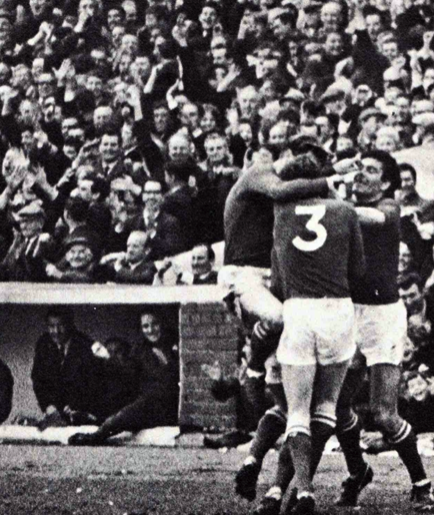
FLAG HAPPY…matchwinner Bobby Lennox is engulfed by team-mates Willie Wallace, Tommy Gemmell and John Hughes after his last-gasp heroics against Morton. Jock Stein and Sean Fallon share the delight in the dug-out.
Eighty minutes gone and still no breakthrough. Eighty-five minutes gone and Morton were holding firm. Eighty-nine minutes gone and there was still no change. Suddenly there was a loud groan from some parts of the ground where supporters had transistor radios, those founts of all knowledge.
Behind the Celtic dug-out, someone proclaimed: “Rangers have won 2-1 at Kilmarnock.” Obviously, it was no hoax. At that moment, Jock Stein turned to Neil Mochan and said: “That’s it, Neil, we’ve lost it.”
They must have thought it was all over, too, in Ayrshire with photographs appearing in the following day’s press of Rangers fans cavorting around Rugby Park, scarves held high amid much celebration. Hold on, though. There were thirty seconds still to play in Glasgow. It wasn’t an effort fit to grace any Goal of the Season gallery.
It wasn’t a pulverising Tommy Gemmell special or a Bobby Murdoch moment of improvised magic. It wasn’t a Jimmy Johnstone flash of solo brilliance. It wasn’t a soaring header from Billy McNeill. Even the players who performed in the green shirts that afternoon find difficulty in recalling it. But, and be sure of this, Bobby Lennox’s winning goal against Morton in the fading seconds was one of the most important strikes for Celtic in the sixties.
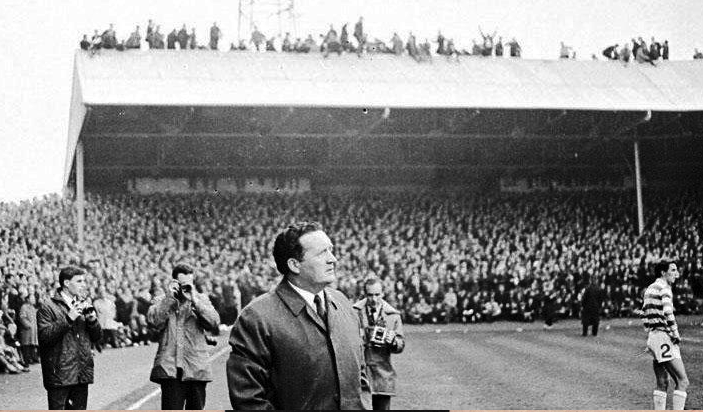
GRANDSTAND FINISH…Jock Stein watches as Celtic fans get an interesting vantage point as their favourites beat Dunfermline 2-1 at East End Park to bring the curtain down on a third successive title at East End Park in season 1967/68.
What does he remember about it? “It looked as though we were about to hand the initiative back to Rangers. As everyone had come to expect from this Celtic team, it was never over until the referee blew for full-time. We knew it was very, very close to the end. Suddenly, there was a chance.
“A ball was floated in, the Morton defence didn’t clear properly and it dropped perfectly right at my feet at the back post. I didn’t hesitate as I lunged forward to stab the ball beyond Andy Crawford from about six yards out. I watched it go over the line with a mixture of elation and relief. We had won.”
The strength, sturdiness and quality of the foundations of Celtic Park were put to the test in that moment. The place was in bedlam. Players hugged each other, total strangers on the terracing embraced as long lost cousins and Jock Stein beamed before heading up the tunnel. Of all people, he must have realised how wrong it was to write off this Celtic team.
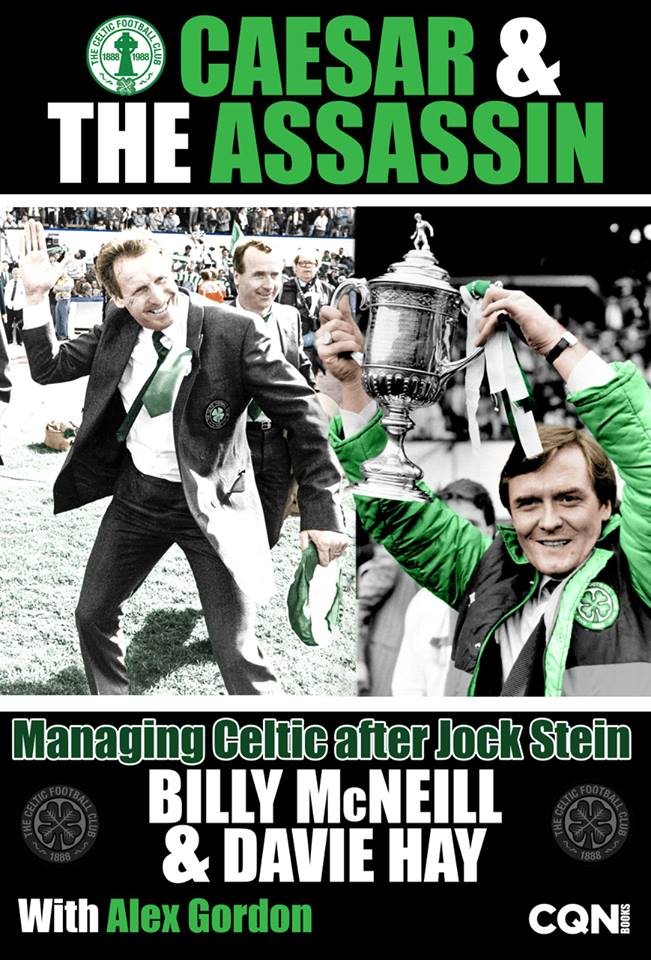
READ ALL ABOUT IT…Alex Gordon’s tribute book to Billy McNeill and Davie Hay, the managers who had the unenviable task of following the legendary Jock Stein at Celtic.
The championship had ebbed and flowed in a truly memorable campaign. Now there was one game to go. Rangers were due to play Aberdeen at Ibrox on Cup Final day – 27 April – and faced the genuine prospect of going through the entire league programme, all thirty-four games, without defeat and still not winning the title. That would have been one for the history books.
Stein was at Hampden that afternoon to watch his old club Dunfermline, the team who had abruptly cut short Celtic’s interest in the tournament, face Hearts. Two goals from Pat Gardner and a penalty-kick from Ian Lister gave the Fifers a 3-1 triumph. It seemed a lifetime ago that Stein had been congratulating his Dunfermline players after their success in the competition over Celtic; in fact, it was seven years minus a day.
He stood to applaud when a national newspaper reporter gave him the news.
“Rangers have lost 3-2 at Ibrox.” Stein asked: “Are you sure?” He was told the Pittodrie side had scored a last-minute winner. Rangers had definitely lost 3-2.
Ignoring the limp that had ended his playing career, the Celtic manager tried to bound down the Hampden steps and his ankle almost buckled under his weight. He stumbled, got his bearings and raced off to spread the news: “This has been a great day,” he declared.
Who could argue?
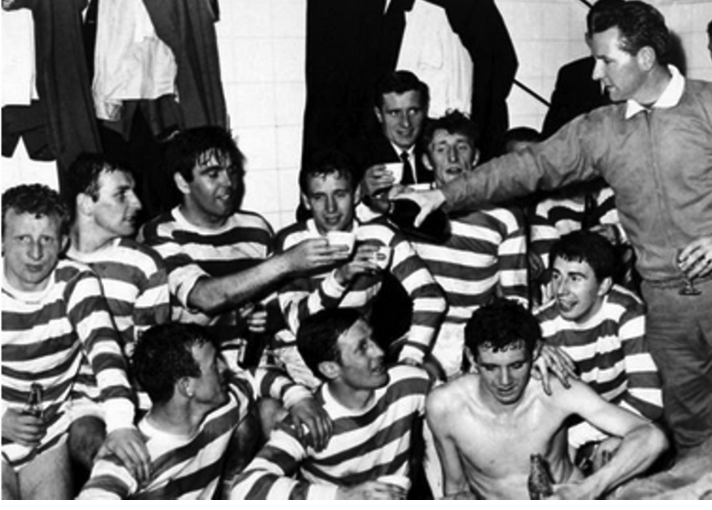
CHEERS…Neil Mochan pours a celebratory champagne for John Hughes as Celtic celebrate at East End Park.
Two goals from Bobby Lennox handed the new champions a 2-1 victory over Dunfermline at East Park a few days earlier. The championship had been won by two clear points.
On April 26 1969 at Hampden, Celtic thumped Rangers 4-0 in the Scottish Cup Final.
Davie White was sacked later that year. Jock Stein had triumphed yet again.

